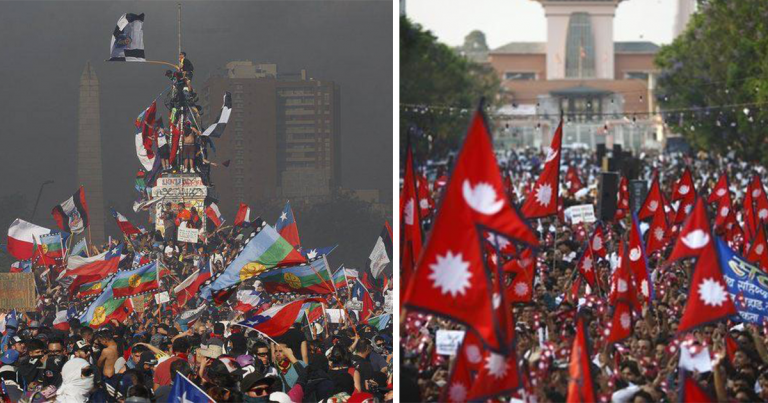
At a time when people of Chile, Bolivia, Spain and Lebanon are protesting against political elites’ ignorance towards growing inflation and social inequality, there is something we Nepalis could learn about resistance.
First let’s learn about Chile protests:
Chile has been reeling under weeks of protests which may have been kickstarted by something as simple as a rise in the price of metro tickets, but the resentment goes back further than that. Protesters are now marching to express their unhappiness over a wide variety of problems ranging from inequality, poor funding for education, to the high cost of healthcare.
Chileans’ anger towards the political elite is palpable and there are calls for President Piñera to resign. Anti-government protests have turned violent in Chile with at least 20 people killed so far in the demonstrations that started last month. Several days of rioting and vandalism later led to President Pinera scrapping the metro fare increase, two weeks after it was launched.
Moreover, in October 29, the president announced sweeping changes to his cabinet in an effort to quell mass protests. Eight ministers, including interior and finance, were said to be replaced.
The move came two days after Piñera put the entire cabinet on notice. However, despite the measures, protesters again clashed with security forces in Valparaiso, Concepcion and the centre of the capital, Santiago.
Protests triggered by a now-suspended rise in the price of metro fares in Santiago widened and spread to other parts of the country.
They also culminated in a march in the capital attended by at least a million people – the biggest demonstrations to be held in Chile since democracy was restored in 1990, according to organisers.
Many demonstrators accused established political parties of being out of touch with their needs. Some of the protests turned violent, ending in looting and arson. A state of emergency was declared and the army deployed to the streets for the first time since 1990.
Though Piñera’s initial response to the mass protests was belligerent, labelling the demonstrators as “criminals” and saying that Chile was “at war with an implacable enemy,” he has since softened his rhetoric and the ministers’ reshuffle is seen as his latest attempt to quell the protests, which have led to the arrests of 7,000 people.
Now, let’s look at ourselves:
Let’s take into account the current scenario of Nepal, where people can be heard voicing their dissatisfaction with how things are not working in the country. The NCP-led government, which boasts two-third majority in the parliament when it comes to flexing power, has failed to deter social inequality and inflation in the country.
After two years in power and announcing hundreds of promising projects, Nepalis are still forced to breathe polluted air and ride on dilapidated public vehicles. The general public were promised prosperity, but are asked to pull weeds from gardens under the Prime Minister’s Employment Program. Freedom of expression is curbed as artists and journalists are arrested for voicing their opinions but rape-accused are given the benefit of the doubt.
Nepalis are, however, silent until it comes to fighting against our neighboring countries. We tend to ignore the biases and inequality that not only exist but thrive under the shelter of a handful of big wigs within the country.
Nepali politicians have long tried to divert our attention from their own delinquencies through anti-India sentiment, and we fall prey to the strategy every time without fail. It’s high time we look into our own governance and hold our politicians accountable for their inefficiency in curbing mounting corruption.




